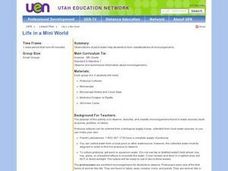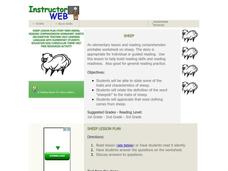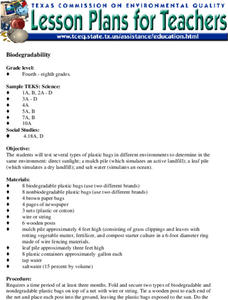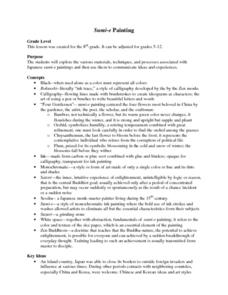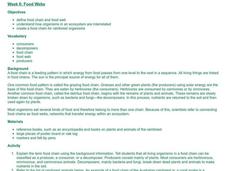Curated OER
Florida's Springs
Students calculate the water usage for irrigation of school grounds. They use maps in determining which areas are irrigated.
Curated OER
Classifying Monocot And Dicot Plants
Sixth graders identify the parts of a flower, and tell the difference between monocots and dicots. They group plant by leaf types and characteristics placing the information in table form on the computer.
Curated OER
"Black Boy"
Students read a series of sentences and decide what literary term is being shown. They also discuss a novel about prejudice.
Curated OER
Life in a Mini World
Sixth graders observe, describe, and classify microorganisms found in water sources. In small groups, they make their own slide, observe the Protozoa under a microscope, and record and classify the microorganisms.
Curated OER
Plants 'R' Us!
Students investigate the interdependencies of plants and animals, and study what a food web is. They create a food web using yarn and images.
Curated OER
Grizzly Hibernation
Students explain why and how grizzlies hibernate. They make a den using cardboard boxes. They write a story told from a new-born grizzly.
Curated OER
Wheat Kernels Bar Graph
Third graders create a bar graph to record how many kernels were in a wheat stalk. They write in math journals two questions from interpreting the graph. They solve math problems from other students.
Curated OER
Water Pollution Experiments
Fifth graders conduct experiments in simulated water pollution using a box of items to hold "pollutants"and an aquarium, representing a waterway. They observe how "rain" from a watering can poured into the box washes the pollutants into...
Curated OER
Sheep
Students practice their reading comprehension by reading about sheep. They describe the characteristics of the animal and discover what type of clothing comes from them.
Curated OER
The High Plains: Land of Extremes
Students complete activities surrounding the study of groundwater movement, energy resources, wind energy, and riparian areas. They debate/role-play the viewpoints of different interest groups in considering whether the black-footed...
Curated OER
Biodegradability
Learners test a variety of plastic bags to test its biodegradability. They record their observations and discuss them once the experiment is complete. They identify materials best suited to be placed in a landfill.
Curated OER
Look At What Nature Has Done!
Students examine how easy it is to break rock. They investigate weathering and erosion in a number of activities.
Curated OER
American Aloha Lesson Plan: Perpetuating Indigenous Cultural Traditions in Diaspora
Students examine the culture and decline of the culture of native Hawaiian people as the islands were colonized. They study issues of cultural identity for Native Hawaiians.
Curated OER
Create a Family Crest
Students create their own family crest using prior knowledge and Japanese and Native American examples of symbolic art. Lesson extensions include the creation of a school crest or woodblock examples of crests.
Curated OER
Sumi-e Painting
Young scholars create Sumi-e paintings and explore the various materials, techniques, and processes associated with those paintings in an effort to better understand Japanese art and culture.
Curated OER
What Do Monarch Caterpillars Eat?
Students use the scientific method to discover what monarch caterpillars eat. They observe the caterpillars for 2 minutes at a time and make observations.
Curated OER
What Do Monarch Caterpillars Eat?
Learners record and analyze what types of food monarch caterpillars will eat.
Curated OER
Be a Geography Observor and Recorder
Students investigate the human and physical features of their school neighborhood. They observe the physical and man made features outside, make illustrations of their observations, and develop a class list of their observations.
Curated OER
A Tree Is More than a Street Name
Eighth graders discuss the role of trees as one of the most important natural resources. In groups, they examine how the forests nearby helped to shape their urban city. Using the internet, they research the use of the forest in early...
Curated OER
Utah's Biomes
Fourth graders discover what a biome is and study biomes that are native to Utah in this series of lessons. They examine how Utah's biomes have changed over time due to the influence of the Mormon pioneers and other human populations.
Curated OER
Food Webs
Students recognize interdependence in a food web by using yarn and notecards to create a food web and discussing what would happen if one of the organisms from a certain trophic level is removed.
Curated OER
Food Webs
Students research rainforest animals and use that information to make a flow chart to show the order in which energy is transferred through several organisms. They label the producers, consumers, and decomposers in their chart.
Curated OER
Food Webs
Students create a bulletin board display illustrating food chains they make from a list of ocean organisms. Students also play a game showing what happens when one of the organisms is removed from the food chain and how they are all...
Curated OER
The Story of Milk
Students listen while the teacher reads the background information. They discuss the main points of the reading. Students color, cut out pictures, and glue the pictures above appropriate sentences to illustrate the correct sequence in...
Other popular searches
- Grasslands
- Grasshoppers
- Leaves of Grass
- African Grasslands
- Sea Grass
- Grasshopper Life Cycle
- The Ant and the Grasshopper
- Grassland Biome
- Grassy Knoll
- Blue Grass
- Grasslands Biome
- Grasshopper Summer



